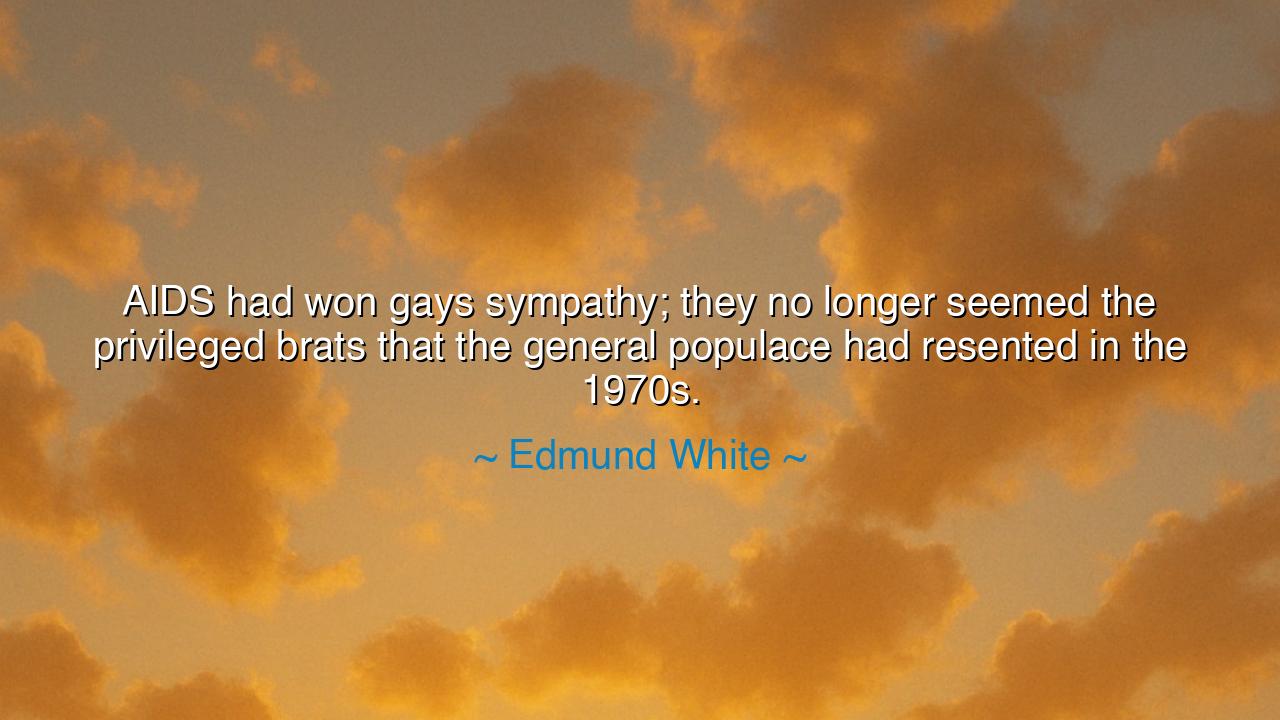
AIDS had won gays sympathy; they no longer seemed the privileged
AIDS had won gays sympathy; they no longer seemed the privileged brats that the general populace had resented in the 1970s.






When Edmund White declared, “AIDS had won gays sympathy; they no longer seemed the privileged brats that the general populace had resented in the 1970s,” he was speaking not with malice but with the sorrowful clarity of a witness to history. His words reveal the cruel paradox of human society: that often, true sympathy and recognition are not granted until suffering is laid bare. The AIDS crisis, with its devastation in the 1980s, transformed how the wider world viewed the gay community—not because society had suddenly grown in compassion, but because tragedy forced it to look upon them with new eyes.
The origin of this perception lies in the cultural tensions of the decades before the epidemic. In the 1970s, many in the gay community were beginning to live more openly, celebrating new freedoms in cities like San Francisco and New York. To some, this visibility appeared as privilege—a flaunting of pleasure, a challenge to conventional morality. Resentment grew in certain circles, fueled by prejudice and misunderstanding. Yet when AIDS struck, the illusion of privilege dissolved. The community once mocked was now seen dying, grieving, and struggling against both the disease and the stigma attached to it. In that suffering, the world was forced to acknowledge their humanity.
History offers us other examples of this tragic dynamic. Consider the plight of the early Christians in Rome. Before persecution, they were seen by many Romans as odd, secretive, even defiant of tradition. But when they were thrown to lions, when they faced torture with faith and dignity, the cruelty of their oppressors became undeniable, and the onlookers’ hearts began to soften. Suffering, though unjust, awakened sympathy. So too, White observes, did the devastation of AIDS compel broader society to see gay men not as caricatures of indulgence, but as human beings enduring one of the greatest plagues of the century.
The meaning of White’s words is both tragic and instructive: it should not take calamity to awaken compassion. And yet, history shows again and again that communities often remain unseen until their suffering can no longer be ignored. Sympathy bought through pain is a bitter currency. The gay community of the 1980s did not seek pity—they sought survival, justice, and dignity. But White notes that pity came anyway, for the disease shattered the false image of the “privileged brat” and replaced it with the reality of human frailty and courage.
The lesson is clear: do not wait for suffering to move your heart. Compassion must not depend upon tragedy. If a people are dismissed, if they are resented, if they are misunderstood, look deeper before fate forces your hand. For every community carries its burdens, even when they are not seen. True wisdom is to grant sympathy before the storm, to honor humanity not because it suffers, but because it exists.
What, then, should you do? First, broaden your sympathies now, in the present, to those whom society mocks or marginalizes. Do not wait for tragedy to open your eyes. Second, educate yourself on the struggles others face, even if they are hidden beneath surfaces of confidence or joy. Third, be a voice of empathy, reminding others that compassion should not be awakened only by grief, but practiced daily as the measure of true civilization.
Thus, let White’s words echo as both warning and call to action: “AIDS had won gays sympathy.” This is the lament—that it required a plague for the world to feel compassion. Let us learn from this grief and vow that in our time, sympathy will not wait for suffering, nor compassion for calamity. Instead, let it be our constant practice, so that no community must bleed before it is embraced as fully human.






AAdministratorAdministrator
Welcome, honored guests. Please leave a comment, we will respond soon